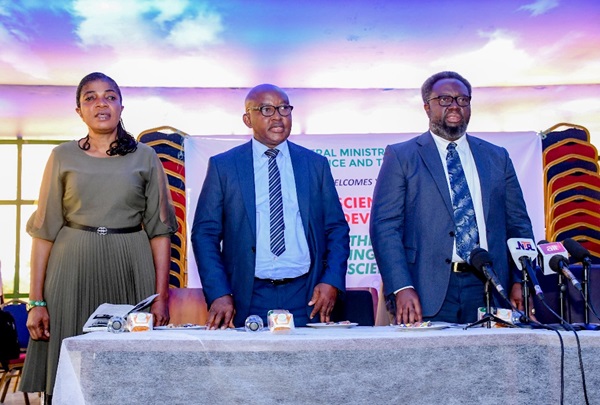
The Minister of Innovation, Science and Technology, Chief Uche Nnaji has urged stakeholders, investors and the academia to actively build trust in scientific methodologies and research outcomes.
The minister emphasised that the success and societal impact of scientific advancements rely heavily on the trust they garner from the public. He made these remarks at the 2023 World Science Day for Peace and Development in Abuja, with the theme ‘Building Trust in Science’.
Nnaji stated that any country not basing its developmental efforts on science and technology cannot expect miraculous results in its quest for socio-economic development. Represented by the special technical assistant to the minister on strategy and programmes, Prof. Martins Ikemonso, Nnaji highlighted the indispensable need to foster trust in scientific endeavours. He stressed that trust forms the bedrock upon which the edifice of scientific progress stands, emphasising the crucial relationship between science and societal development.
“It is important to note that achieving sustainable progress and societal advancements depends on trust in the scientific processes through ensuring transparency, credibility and ethical practices in every scientific pursuit,” he asserted.
The minister assured that the Federal Ministry of Innovation, Science and Technology remains dedicated to upholding trust in science. Their commitment extends beyond scientific advancements to fostering an environment where the public places confidence in the integrity and reliability of scientific discoveries and innovations.
To encourage trust in the nation’s scientific potential and nurture a culture of excellence in scientific pursuits, the ministry organises the 774 Young Nigerian Scientists Presidential Award (774-YONSPA) annually. This programme aims to stimulate the interest of young people in the sciences, promoting careers in science, technology, engineering and mathematics (STEM). The competition spans across the 774 local government areas (LGAs) of the Federation, culminating in a grand finale in Abuja. Winners receive cash awards and scholarships.
In an effort to promote trust by offering an environment for ethical and sustainable technological innovations, the ministry, through the National Board for Technology Incubation, established technology incubation centres across the 36 states of the Federation. These centres are designed to nurture and grow new and small businesses, products, innovations and entrepreneurs through early-stage support.
Nnaji also revealed that the ministry has developed the National Policy on Nanotechnology, soon to be presented to the Federal Executive Council for consideration and approval to expedite national nanotechnology development for economic diversification.
“To commercialise our indigenous research and development (R&D) in the country, we have designed an annual programme called the ‘Science and Technology Expo’. It strategically showcases the use of science for technological inventions, innovations, and primarily, the R&D products and results of the FMST’s agencies and research activities in tertiary institutions across the country,” he added.
Calling on inventors and innovators from various sectors to participate in the Expo 2024, Nnaji invited students nationwide to showcase their inventions and innovations. He emphasised that building and maintaining trust in science is a collective responsibility requiring collaboration among scientists, policymakers, educators and the general public.
The permanent secretary, Mr. James Sule noted that the event is happening simultaneously across the country, providing a platform to keep citizens informed about developments in the field of science.
The national professional officer representing UNESCO, Dr. Enang Moma stressed the importance of openness in science, access to quality STEM education, higher representation of women in science and sustainable funding mechanisms.
An education expert and physics professor from the Federal University of Technology, Minna, Prof. Uno Uno described building as the process of establishing, constructing, or structuring. Trust, he explained, involves confidence, reliability and belief, while science is a systematic study involving measurement and observation. He highlighted challenges in science research, including poor communication, inadequate funding, government policies and poor incentives.

